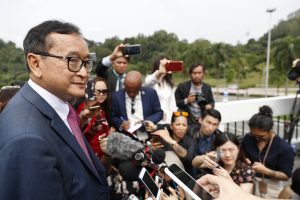Few long-term observers were surprised when opposition leader Sam Rainsy failed to return to Cambodia on November 9 to lead a promised peaceful uprising against 34-year ruler Hun Sen.
The plan was always a long shot, but as Rainsy heads into his fifth year in exile, many will begin to wonder whether he and the opposition Cambodia National Rescue Party (CNRP) can continue to remain relevant.
Coverage of the CNRP has tilted negative in recent months – many foreign correspondents seemed almost gleeful at Rainsy’s failure and stories abound of a split in the CNRP between its two founders, Rainsy and Kem Sokha.
The truth is, however, that the CNRP still retains its most important asset – popular support.
“I see no indication that the party’s support has dissipated. While the CPP has effaced the party as a legal entity, it has not succeeded in solving many of the problems that led a large chunk of the Cambodian electorate to vote for the CNRP in the first place,” said Sebastian Strangio, author of Hun Sen’s Cambodia. “If a free election were held tomorrow, with the CNRP participating, it would be likely a very close call.”
The CNRP won around 44 percent of the vote in the 2013 national election (despite widespread irregularities) and again in the 2017 commune election. This strong showing led to Sokha’s arrest for treason and party’s arbitrary dissolution prior to the 2018 national election. Despite the CNRP’s absence, none of the minor pro-democracy parties benefitted at the voting booths. Even the Grassroots Democracy Party, which has become something of a darling to Western media and academics, failed to attract any meaningful support.
The CNRP was formed in 2012 by a merger between the Sam Rainsy Party (SRP) and Sokha’s Human Rights Party (HRP) in order to stop splitting the anti-government votes. There is undoubtedly some friction between the two sides – as there always has been – but reports of a split may be exaggerated.
“In a very real sense, the party is its personalities, which accounts for both the persistent frictions between the Rainsy and Sokha wings of the party, and the CNRP’s general lack of policy detail,” said Strangio.

































